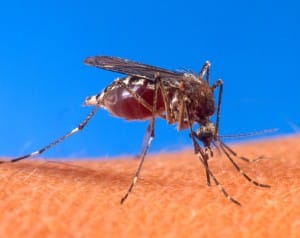Source(s): Walter Reeves, College of Agricultural and Environmental Sciences, Former County Extension Agent – DeKalb County
Buzzzzzzzz…SMACK! Spring and summer rains can cause a population explosion of mosquitoes! Two kinds of mosquitoes are commonly seen (and felt!): the ” swamp” or “Egyptian” mosquito, which feeds at dusk and the Asian tiger mosquito, which feeds during the day. The tiger mosquito has tiny white stripes around its rear legs. Since the tiger mosquito flies and feeds during the day, it is the one that causes the most distress to gardeners and others.
Although they can be blown into your yard by the wind, it is likely that the mosquito biting you has come from just a few yards away! Adult mosquitoes lay eggs in damp soil or rotting vegetation. The eggs remain dormant until rain saturates the area. A small, hidden pool of rainwater that remains for just ten days may produce hundreds of ravenous pests.
Many people have seen the fogging trucks which operate at dusk in communities along the coast of Georgia. The insecticide fog stays close to the ground and kills most of the night feeding swamp mosquitoes. Unfortunately, it is VERY difficult to control Asian tiger mosquitoes with fogged or sprayed insecticides. Since these blood-suckers feed during the day, fogs and sprays are quickly dispersed by the wind.
NO STANDING WATER
The BEST first step toward control for either type of mosquito is to look for pockets of water outdoors and drain them. An organized search among neighbors may turn up dozens of mosquito hiding places. Look for clogged gutters, leaf-filled drains, drain outlets from air-conditioners, plastic wading pools, dog dishes, soft drink cans, plastic bags, old tires, birdbaths, potted plant saucers, standing water in tire ruts, stumps, tree holes, puddles hidden under English ivy and pools left by flooded streams.
TREAT PUDDLES
If a pool of water can’t be permanently drained, i.e. bird baths and landscape water features, a special organic mosquito control can be used. The mosquito disease spore Bacillus thuringensis (B.t.) is sold at garden centers. A common brand name is “Mosquito Dunks”. These can be put in pools of standing water, where they provide control for several weeks. The active ingredient has no effect on birds or animals.
FOGGERS? MAYBE
Temporary relief outdoors can be had by using a fogger (not a garden sprayer) made specifically for mosquito control. A special insecticide will be sold for use with the fogger. Use it a few hours before an outdoor activity is planned. It will not be very effective on a windy day.
MOSQUITO PLANTS
In recent years, a plant advertised to repel mosquitoes has appeared in garden centers. This citrosa plant is actually a scented geranium. It has not been proven effective for repelling mosquitoes. The herb lemon balm also is reputed to repel insects. It is possible that if you rub the plant leaves on your skin, insects will be kept away for a short time. One experimenter estimated plant oils to be only 40 – 60 percent as effective as DEET, the active ingredient in most mosquito sprays (Off, Cutters, etc.). If you depend on the citrosa plant to keep mosquitoes away from your patio, the results may be much less than you desire. The citrosa is grown as an annual in Atlanta. It may be perennial in places where frost is rare.
CITRONELLA CANDLES
Citronella oil is extracted from citronella grass, which is grown in the tropics. The oil can be vaporized by mixing it with wax and manufacturing a candle to be burned outdoors. Citronella oil is effective for repelling insects. However, the smoke and odor may be too strong for some people’s taste. Several candles must be used to be effective outdoors.
ULTRASONIC REPELLERS
These gadgets are a perfect example of the quotation “If it sounds too good to be true it probably is. ” In fact, the ultrasonic mosquito repellers are absolutely useless. Do not waste your money on ultrasonic mosquito, flea, rat or squirrel repellers!
REPELLENT SPRAYS
Sometimes the best you can do is to station cans of mosquito repellent spray near the garden, lawn and deck. The active ingredient, DEET, is a proven insect repellent. Questions have arisen concerning the safety of the chemical, so avoid heavy application to your skin. Lightly spray exposed flesh plus sock tops, pants cuffs and t-shirt collars. The repellent sprays may be our only hope when all else fails.
Center Publication Number: 29
- Growing Gourds - September 24, 2013
- Growing Broccoli - September 24, 2013
- Landscape Drainage Problems - September 24, 2013